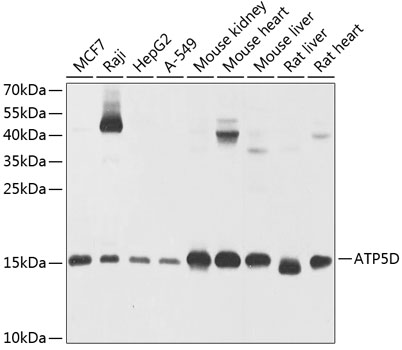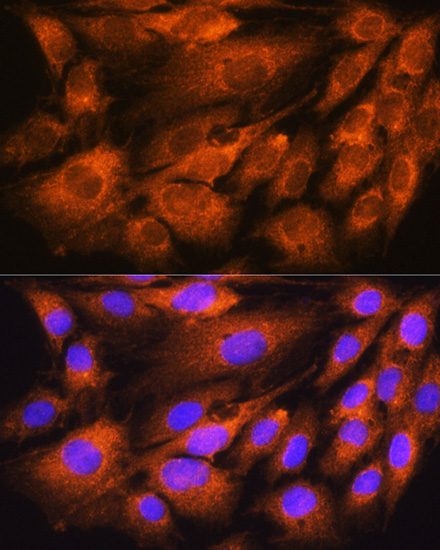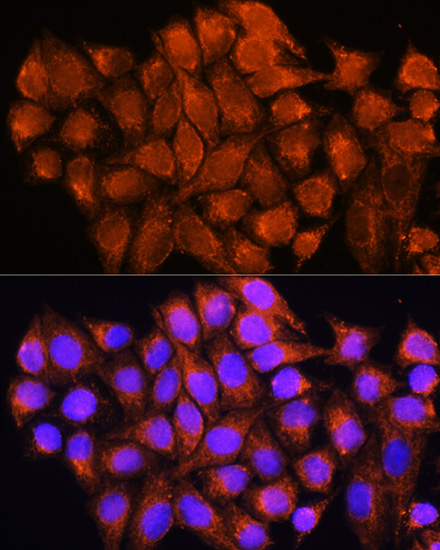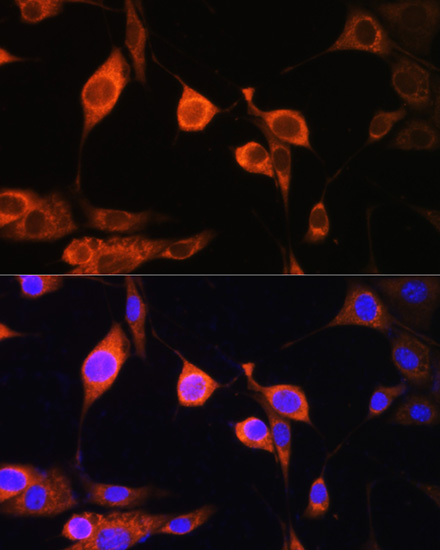Metabolism Antibodies 3
Anti-ATP5D Antibody (CAB9929)
- SKU:
- CAB9929
- Product Type:
- Antibody
- Applications:
- WB
- Reactivity:
- Human
- Reactivity:
- Mouse
- Reactivity:
- Rat
- Host Species:
- Rabbit
- Isotype:
- IgG
- Research Area:
- Metabolism
Description
| Antibody Name: | Anti-ATP5D Antibody |
| Antibody SKU: | CAB9929 |
| Antibody Size: | 20uL, 50uL, 100uL |
| Application: | WB IF |
| Reactivity: | Human, Mouse, Rat |
| Host Species: | Rabbit |
| Immunogen: | Recombinant fusion protein containing a sequence corresponding to amino acids 1-168 of human ATP5D (NP_001678.1). |
| Application: | WB IF |
| Recommended Dilution: | WB 1:500 - 1:2000 IF 1:50 - 1:200 |
| Reactivity: | Human, Mouse, Rat |
| Positive Samples: | MCF7, Raji, HepG2, A-549, Mouse kidney, Mouse heart, Mouse liver, Rat liver, Rat heart |
| Immunogen: | Recombinant fusion protein containing a sequence corresponding to amino acids 1-168 of human ATP5D (NP_001678.1). |
| Purification Method: | Affinity purification |
| Storage Buffer: | Store at -20'C. Avoid freeze / thaw cycles. Buffer: PBS with 0.02% sodium azide, 50% glycerol, pH7.3. |
| Isotype: | IgG |
| Sequence: | MLPA ALLR RPGL GRLV RHAR AYAE AAAA PAAA SGPN QMSF TFAS PTQV FFNG ANVR QVDV PTLT GAFG ILAA HVPT LQVL RPGL VVVH AEDG TTSK YFVS SGSI AVNA DSSV QLLA EEAV TLDM LDLG AAKA NLEK AQAE LVGT ADEA TRAE IQIR IEAN EALV KALE |
| Gene ID: | 513 |
| Uniprot: | P30049 |
| Cellular Location: | Mitochondrion, Mitochondrion inner membrane |
| Calculated MW: | 17kDa |
| Observed MW: | 17kDa |
| Synonyms: | ATP5D |
| Background: | This gene encodes a subunit of mitochondrial ATP synthase. Mitochondrial ATP synthase catalyzes ATP synthesis, utilizing an electrochemical gradient of protons across the inner membrane during oxidative phosphorylation. ATP synthase is composed of two linked multi-subunit complexes: the soluble catalytic core, F1, and the membrane-spanning component, Fo, comprising the proton channel. The catalytic portion of mitochondrial ATP synthase consists of 5 different subunits (alpha, beta, gamma, delta, and epsilon) assembled with a stoichiometry of 3 alpha, 3 beta, and a single representative of the other 3. The proton channel consists of three main subunits (a, b, c). This gene encodes the delta subunit of the catalytic core. Alternatively spliced transcript variants encoding the same isoform have been identified. |
| UniProt Protein Function: | ATP5D: Mitochondrial membrane ATP synthase (F(1)F(0) ATP synthase or Complex V) produces ATP from ADP in the presence of a proton gradient across the membrane which is generated by electron transport complexes of the respiratory chain. F-type ATPases consist of two structural domains, F(1) - containing the extramembraneous catalytic core, and F(0) - containing the membrane proton channel, linked together by a central stalk and a peripheral stalk. During catalysis, ATP turnover in the catalytic domain of F(1) is coupled via a rotary mechanism of the central stalk subunits to proton translocation. Part of the complex F(1) domain and of the central stalk which is part of the complex rotary element. Rotation of the central stalk against the surrounding alpha(3)beta(3) subunits leads to hydrolysis of ATP in three separate catalytic sites on the beta subunits. Belongs to the ATPase epsilon chain family. |
| UniProt Protein Details: | Protein type:EC 3.6.3.14; Energy Metabolism - oxidative phosphorylation; Hydrolase; Mitochondrial Chromosomal Location of Human Ortholog: 19p13.3 Cellular Component: mitochondrial inner membrane; mitochondrial matrix; mitochondrial proton-transporting ATP synthase complex Molecular Function:ATPase activity; hydrogen ion transporting ATP synthase activity, rotational mechanism; transmembrane transporter activity Biological Process: ATP biosynthetic process; ATP synthesis coupled proton transport; mitochondrial ATP synthesis coupled proton transport |
| NCBI Summary: | This gene encodes a subunit of mitochondrial ATP synthase. Mitochondrial ATP synthase catalyzes ATP synthesis, utilizing an electrochemical gradient of protons across the inner membrane during oxidative phosphorylation. ATP synthase is composed of two linked multi-subunit complexes: the soluble catalytic core, F1, and the membrane-spanning component, Fo, comprising the proton channel. The catalytic portion of mitochondrial ATP synthase consists of 5 different subunits (alpha, beta, gamma, delta, and epsilon) assembled with a stoichiometry of 3 alpha, 3 beta, and a single representative of the other 3. The proton channel consists of three main subunits (a, b, c). This gene encodes the delta subunit of the catalytic core. Alternatively spliced transcript variants encoding the same isoform have been identified. [provided by RefSeq, Jul 2008] |
| UniProt Code: | P30049 |
| NCBI GenInfo Identifier: | 584812 |
| NCBI Gene ID: | 513 |
| NCBI Accession: | P30049.2 |
| UniProt Secondary Accession: | P30049,Q6FG90, D6W5Y3, |
| UniProt Related Accession: | P30049 |
| Molecular Weight: | 17kDa |
| NCBI Full Name: | ATP synthase subunit delta, mitochondrial |
| NCBI Synonym Full Names: | ATP synthase, H+ transporting, mitochondrial F1 complex, delta subunit |
| NCBI Official Symbol: | ATP5D |
| NCBI Protein Information: | ATP synthase subunit delta, mitochondrial |
| UniProt Protein Name: | ATP synthase subunit delta, mitochondrial |
| UniProt Synonym Protein Names: | F-ATPase delta subunit |
| UniProt Gene Name: | ATP5D |
View AllClose










